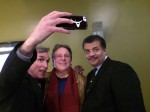When producer Richard Barton Lewis saw actor Asa Butterfield in “Hugo,” he knew that the young actor was perfect for the lead in his next project, “The Space Between Us.”
Lewis met Butterfield over a Skype call, and the experience reminded him of the very movie he was making. The call kept cracking up and breaking, almost like Butterfield was on another planet.
Despite finding the perfect actor to play his Martian protagonist, the UCLA alumnus who also worked on the story for the film, would still have to wait a few years to work with Butterfield.
The road to production was a bumpy one – the original company producing the film faced financial troubles and was unable to continue. The project eventually ended up in the hands of newly created STX Entertainment and comes out in theaters Friday.
The film follows Gardner Elliot’s (Asa Butterfield) journey as he leaves Mars, the planet on which he was born and the only home he’s ever known, to visit Earth. On Earth, he meets Tulsa (Britt Robertson), a girl he’s only ever communicated with online. Together, they set out on a cross-country road trip to find Gardner’s father. Their journey becomes a race against the clock as Gardner struggles to survive in the planet’s unfamiliar atmosphere and still experience everything Earth has to offer.
The Daily Bruin’s Olivia Mazzucato spoke with Lewis about his passion for the message of “The Space Between Us,” his personal connection to the film and his advice to the next generation of filmmakers.
Daily Bruin: Why did you decide to tell this story? What about it spoke to you on a personal level?
Richard Barton Lewis: (One of my earlier films), “August Rush” was actually inspired by my son, who’s now 19 and a freshman at Stanford (University). As he grew up, he became obsessed with and fascinated with space – like many young boys do – and also with flying and travel. As we were developing this script, (my son) was determined to get his pilot’s license, and he started flying at 13.
And as you see in the movie, Asa Butterfield and he look very similar and are the same age. Asa in real life is 18 – just turned 19 – and my son is 19. They’re both tall and lanky and incredibly curious and super bright kids. So I made the movie for my son in many ways, inspired by his obsession and his interest in space travel.
DB: How did you translate traditional themes of a coming-of-age story into a nontraditional science fiction story?
RL: At a certain age, everybody feels alienated. They don’t feel like they fit in; I don’t care who they are. That’s just human nature as you socialize and grow older. So here you have two people, one who’s on Earth played by Britt Robertson – who’s a foster child. She’s been in five or six homes, she doesn’t trust anyone, she feels alienated. She’d actually rather be off the planet if she could.
And you have a young man who’s on Mars who desperately wants to be on Earth (and) is an alien … so he’s as isolated as you could ever be. I think people feel that way; everyone feels that way.
DB: How did you stay motivated and just keep pushing for this project throughout the preproduction process, which you started more than seven years ago?
RL: It’s somewhere internal for me. I am dogged. This is my 16th or 17th movie and they’re all hard to get made. I just believed in the story. I thought it was incredibly unique … I was determined to get it made, it’s just what you do as a producer. If you are convinced it’s something worthy, you just keep driving.
DB: What do you hope audiences will take away from the film?
RL: As brilliant as the movie “The Martian” was, it’s a bit of a different message. At the end, the movie was, “Get me the hell off this rock.” … The opposite is the emphasis on this story.
Here’s a boy who’s born on Mars, who didn’t have any say over where he was born but realizes this is his destiny and part of leading the charge to help colonize Mars and other planets. So I hope that people come away from watching this movie with ambition … there seems to be this growing urgency to go to Mars.
DB: What advice would you give to other UCLA students who are looking to follow your path?
RL: I think it’s really important to have something that you’re interested in. You don’t have to be a film major undergraduate to be in the film business. I honestly think sometimes it’s better to be an English major or history major. Have some sense of the world. Have some sense of stories that you find interesting.
Really focus on what moves you, what you think moves other people, but at the end of the day, if you’re going to go through this journey, have something you want to say and stick to it.
